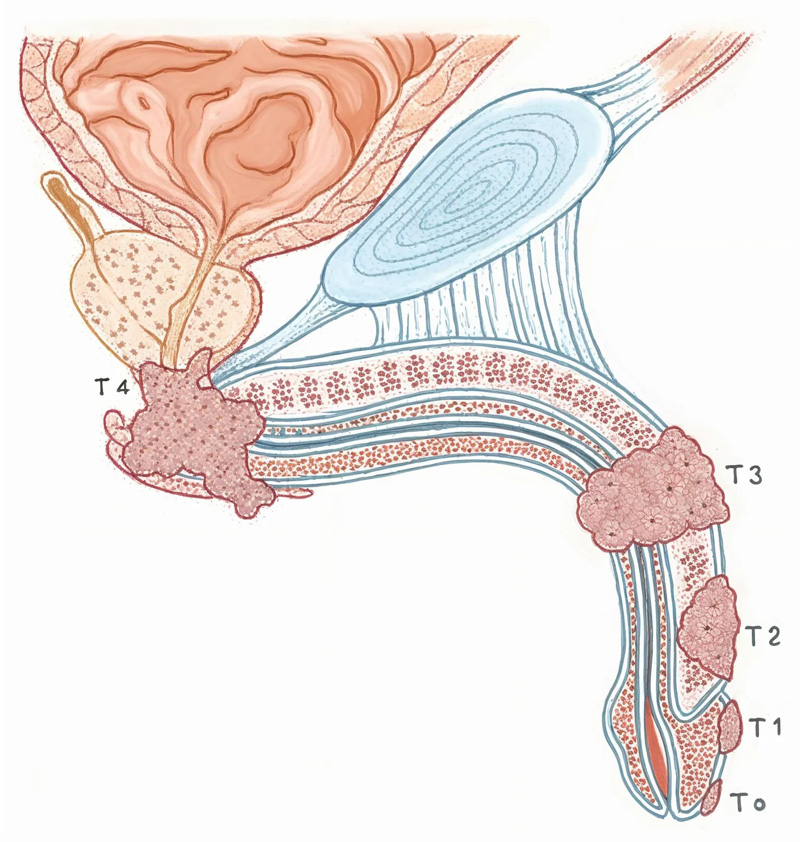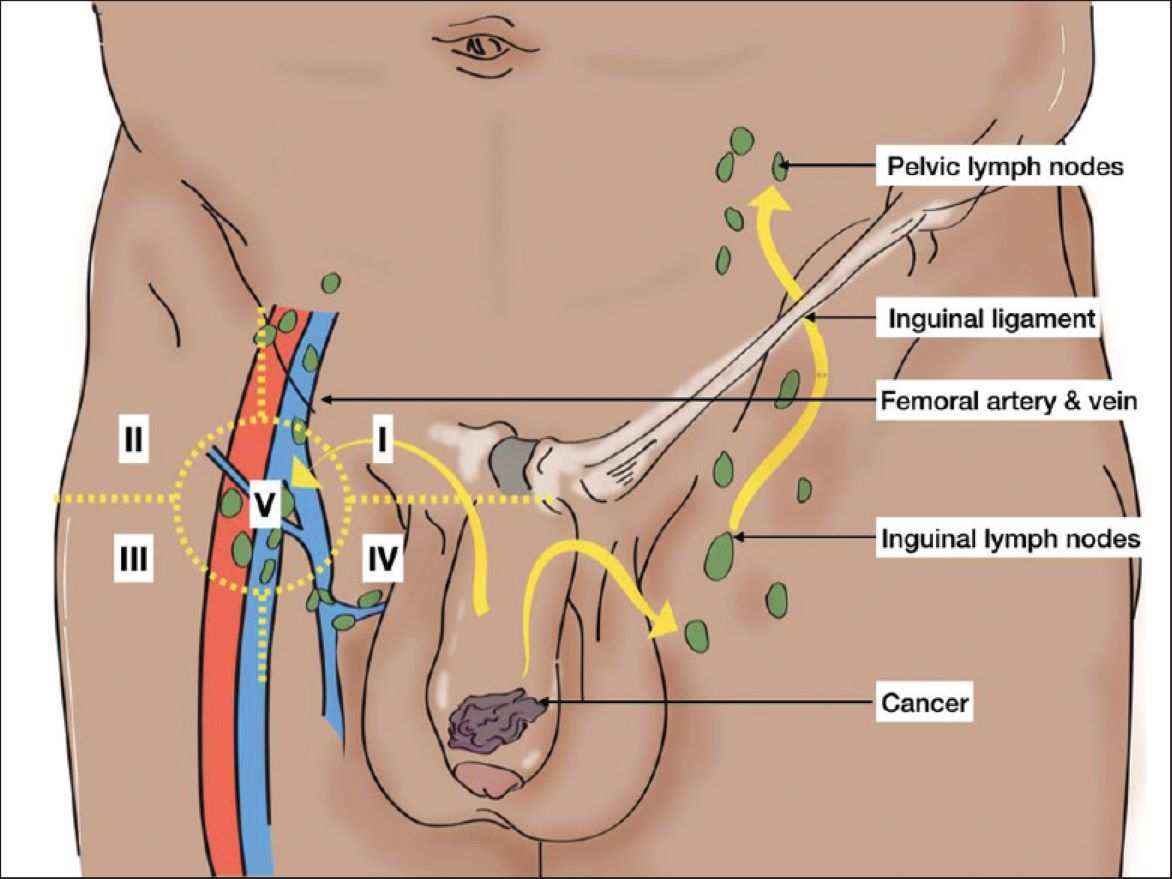Penile Cancer
Penile Cancer Treatment
Penile cancer is an uncommon but serious malignant neoplasm of the penis, which functions as a male reproductive organ. This occurs with the uncontrolled multiplication of abnormal cells in penile tissue, forming a tumor or a mass. A wide spectrum of cancer types can occur in penis, but the most frequent is squamous cell carcinoma. Despite the lower incidence compared to other cancers, it is associated with high morbidity and poor survival, hence early recognition and early Penile Cancer treatment are vital for optimal outcomes. Let’s know about common symptoms, stages, and how Penile Cancer surgery in Ahmedabad at our Center by Specialist in Uro Oncology can help you overcome this disease.

Also, you’ll know about latest Robotic Surgery treatment options available in India for Penile Cancer in order to know how best this condition can be treated with less morbidity and improve survival.
SYMPTOMS OF PENILE CANCER
Penile cancer symptoms manifest differently, and it might not be that similar signs will appear for everyone.
Most common symptoms include -
⦁ Change in genital skin color or texture
⦁ Bleeding or discharge from the penis shaft or Glans
⦁ Pain or tenderness in the area
⦁ Thickening or lumps on the penis
⦁ Foul odor from the lesion on penis
⦁ Enlarged lymph nodes in groin
⦁ Ulcers or sores on the penis
⦁ Phimosis (tightening of the foreskin)
CAUSES AND RISK FACTORS
Let’s know about the causes and risk factors associated with development of malignancy in Penis:
Age - Penile cancer is most commonly diagnosed in older men in 60s or 70s.
Smoking - Tobacco consumption or smoking is identified as the most common risk factor for penile cancer
Phimosis and Smegma - Phimosis (the foreskin is tight and cannot be retracted) and Smegma (accumulation of smegma in uncircumcised men) may elevate the risk of developing penile cancer.
Human Papillomavirus (HPV) Infection - Certain strains of HPV are connected with an increased risk of penile cancer.
UV Light Treatment of Psoriasis - Prolonged exposure to UV light during psoriasis treatment, especially using psoralen and ultraviolet A (PUVA) therapy, may increase the risk of penile cancer.
DIAGNOSIS
When you notice any of the symptoms mentioned above which might lead to suspicion of penile malignancy, Prompt consultation with a UroOncologist who specialises in management of Urological Cancer is paramount. On consultation, your Urologist will ask for a detailed history and conduct a thorough physical examination. Depending on the level of suspicion of Penile Cancer, following tests can be prescribed to confirm the diagnosis, that makes it appropriate for our expert to provide you the most helpful option of Penile Cancer Surgery in Ahmedabad at our clinic.
Biopsy - Biopsy of the ulcer or growth or suspicious lesion will be taken by the urologist and sent for microscopic examination. This will confirm the disease.
Computed tomography (CT) scan - A CT scan of the abdomen and pelvis might be advised after biopsy confirmation to determine the spread of cancer to regional lymph nodes or nearby organs.
Magnetic resonance imaging (MRI) - This provides a detailed penile imaging to ascertain local staging of primary penile cancer and helps in determining strategy for penile preserving surgery.
Positron emission tomography (PET) or PET-CT scan - It is a medical imaging test which reveals biochemical or metabolic function of your tissue and organs. It might be recommended if there is suspicion by your treating doctor that there may be distant metastasis.
Stages of Penile Cancer
Once biopsy confirmation and staging tests are done, our team led by Expert Dr. Rohan Patel will review the reports and determine the stage of Penile Cancer and discuss what type of treatment method should be used, for example, surgery, radiation therapy, or chemotherapy.

The various stages of Penile Cancer include:
Stage I - Localized Penile Cancer The cancer has spread to deeper parts of connective tissues beneath the skin of the penis. It is still localized in the penis only; it has not reached neighboring lymph nodes or distant organs.
Stage II - Locally Advanced Penile Cancer At this point, cancer has spread locally to involve adjacent blood or lymph vessels invasion of deeper parts at the center shaft of the penis, and it may also affect the urethra. Still, it is strictly localized in the penis and cannot be considered a distant metastasis.
Stage III - Regional Spread On stage three, the presence of cancer is more advanced, and it may have infiltrated central parts such as the penile or urethra areas. Furthermore, it has currently metastasized into one or several inguinal nodes, suggesting regional dissemination inside the pelvis.
Stage IV - Advanced Penile Cancer In this stage, the cancer has progressed much more. It could have invaded nearby tissues like the prostate gland or any of the local lymph nodes. It could have grown even in distant parts of the body like lungs, bones, liver and as such, made treatment more complicated or severe.
Our Penile Cancer Specialist Dr. Rohan Patel, will review with you in detail options of conventional open surgery and the latest and most advanced Robotic Surgery for Penile Cancer Treatment in Ahmedabad along with its advantages, so that you can get the Best Outcomes comparable to International standards.
Penile Cancer Treatment
The approach to Best Management of penile cancer is dictated by variety of factors, such as the stage and location of the tumor and the patient’s underlying comorbidities or preferences. In general, Surgery in the form of Partial or Total Penectomy with Penile Reconstruction is the mainstay of treatment in Localized Penile Cancer. Removal of lymph nodes (Inguinal Lymph Node Dissection) via open or Robotic Surgery is recommended by Urooncologist in locally advanced stage.

In case of Advanced Stage, chemotherapy, targeted and immuno-therapy are recommended. Continue reading further to know more in detail about each Penile Cancer Treatment we provide.
Partial or Total Penectomy - This includes removing the tumor along with a clear margin of normal tissue. The penis may have to be partially or completely removed if the tumor is large. It is the treatment of choice in early-stage Penile Cancer. If the tumor is very small and involves the prepuce, then circumcision is curative.
Inguinal Lymph Node Dissection - If the cancer is High Grade, or involves deeper tissues of penis, or has spread to Inguinal or pelvic lymph nodes, a surgical removal of such lymph nodes is the recommended treatment. This can be done via Traditional Open Surgery which has high morbidity and complications or via Robotic Surgery (VEIL) which is associated with better outcomes and minimal complications. At our hospital, we have the synergy of the latest DaVinci Xi surgical robot along with experienced doctor to provide the Best Outcomes in Penile Cancer Treatment.
Radiation Therapy - In the case of Advanced Stage, Radiotherapy is recommended for downstaging or palliative care. It involves the use of high-energy beams focused on cancerous cells to kill them.
Chemotherapy - In Locally advanced and Stage 4 Penile Cancer, Chemotherapy is the treatment of choice.
Topical Medications - In the case of some superficial penile cancers, certain topical treatments can include applying such medications as 5-fluorouracil (5-FU) or imiquimod cream directly to the area involved.
Robotic Surgery in Penile Cancer
Robotic surgery is the latest and the most advanced form of Surgery employed worldwide at the Best Cancer Centers for improved Outcomes. At our hospital, Dr. Rohan Patel who is a pioneer in the field of Robotic Surgery, has experience of over 15 years in treating Penile Cancer.
The various surgeries for penile cancer done robotically at our cancer center include :
Robotic Inguinal Lymph Node Dissection (ILND or VEIL) - Also known as Video Endoscopic Inguinal Lymph Node Dissection, it Utilizes robotic-assisted surgical technology to remove affected lymph nodes in the groin region with enhanced precision and minimal invasiveness, potentially reducing postoperative complications and promoting faster recovery.
Robotic Pelvic Lymph Node Dissection (ILND) - We routinely use Robotic Surgery to perform Pelvic Lymph Node Dissection in patients who have disease involving Pelvic Lymph nodes. It not only decreases morbidity, but also leads to early initiation of adjuvant chemotherapy.
At our Center, our dedicated Uro Oncology team led by Dr. Rohan Patel provides latest treatment methods while showing utmost compassion towards patients. He is recognized to be among the top Penile Cancer Specialists in India, consistently providing results comparable to international standards. His dedication to the best and advanced management of penile cancer through Robotic Surgery in Ahmedabad, has led him to become one of the most sought after Uro Oncologists in India.
To Consult Now with the Senior Uro-oncologist at the Best Hospital for Penile Cancer Treatment in Ahmedabad.
Advanced Urology
Better Living

Why Choose Dr. Rohan Patel For Penile Cancer Treatment in Ahmedabad?
At Ananta Urology and Robotics Clinic, we provide personalized care for each patient. You will receive the attention and expertise you deserve. We use advanced robotic surgery techniques that help you recover faster and achieve better results.

0+
Years of Expertise

0+
Satisfied Patients

0+
Successful Robotic Surgeries

Comprehensive Cancer Team

Top-Rated Urooncologist

Fellowship from Vattikuti Foundation (USA)

